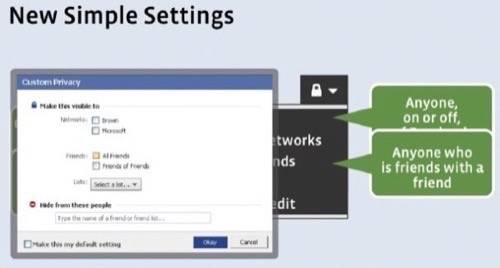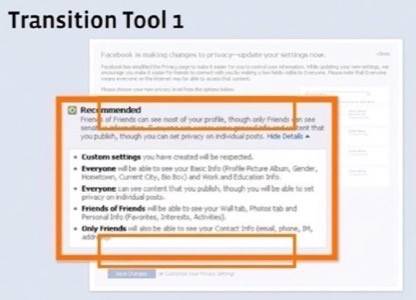Facebook is holding a press webcast and phone call this morning regarding upcoming changes to its privacy policies and features. It’s an ongoing story we’ve been following closely but as we wrote on Monday in our in-depth coverage of changes underway: Given the change underway and the company’s move to lobby governments around the world in favor of its privacy philosophy, we think it would be a good idea to have a more thorough public conversation about what that philosophy is.

This morning’s call could be an important chapter in that conversation. We’ll be live blogging it below starting at 10am PST but we begin by laying out what we think the big questions are. Please feel free to contribute your questions in comments; we’ll likely get a chance to ask the company one question on the call. It could be yours.
These are complicated and important matters. We’ll be live blogging the official presentation when it begins below these short discussions of what we think are the big questions. You can skip to the live blogged updates using this link.
What Is Facebook’s Definition of Privacy?
Facebook’s official privacy policy has long stated that you are in control of the information you chose to share. What does that mean, though? Until last week all users really only had two big choices about the visibility of their content: it was either public to everyone or visible to all their friends. Visibility to networks, like your school or city, was one of many complicating factors in a situation that confused most people. Saying that users have control over their information on Facebook has seemed like a stretch. It is very important to many Facebook users that at the very least, people not be given access to their information without approval.
As we discussed earlier this week, though, real life doesn’t work like that – all public or all private. Our contemporary understanding of privacy in the real world supports the idea that some information can be shared with certain people in certain circumstances and remain private as long as that context is maintained.
Facebook’s latest privacy option, so far rolled out only to users who have their default profile privacy set to public, is to allow shared updates and content to be visible only to certain people a user is connected to on Facebook. “This is my status update, but only let friends from work see this one, or don’t let family see this one.” It’s a radical change but one that makes a lot of sense. It’s not well implemented so far but it indicates a more sophisticated understanding of privacy on the part of Facebook.

Right: Chris Kelly is Chief Privacy Officer & Head of Global Public Policy at Facebook and a candidate for the California Attorney General’s Office.
Facebook has recently hired lobbyists in the US and the EU to advance its privacy philosophy. We hope to get more clarification on today’s call.
How Will Facebook Resolve the Tension Between Open and Closed?
We interviewed Facebook founder Mark Zuckerberg in March 2008 and asked him about Data Portability, the movement calling for online information to be made transferable from site to site so that features and customization can be built on past activity and so users can truly own the data they created through that activity.
Some people see data portability as functioning like the ability to move money from one bank to another based on quality of competing services. Your information is like your cash deposits. Other people see data portability as a threat to privacy; they are more concerned about being able to limit visibility of their information and they are willing to keep that information locked in to a particular website that does a good job protecting it.
Zuckerberg said then that privacy is an essential pre-condition to data portability. Unless users know their wishes for keeping information private will be respected, they are unlikely to produce much information online that could be made portable. That makes sense. Zuckerberg also made statements in that interview a year and a half ago that foreshadowed last week’s changes to support more granular sharing.
In the end, he told us that: “We are philosophically aligned [with the data portability movement]. We are pushing in our own way to make the world a more open place. It’s going to be good when it happens.”
As Facebook has extended its grasp on user data around the web through Facebook Connect, the company’s system that lets you sign into other sites using your Facebook credentials, it has become clear that the company wants to be a full-service stop that users will not withdraw their data from. Unfortunately, that lock-in makes it even more important that users’ privacy wishes are respected – there’s no where else they can go without going social-history bankrupt.
Some amount of increased openness is in Facebook’s best interest though, even in the short term. From global public search on the site (ala Twitter) to giving advertisers and application developers more access to user data in order to continue innovating – there is reason for Facebook to open up some. There are probably far more people in Iran using Facebook to publish information about the conflict there than there are Iranians using Twitter, for example, but outsiders can’t see those Facebook messages so Twitter is getting all the attention.
How will Facebok resolve the tension between the pull towards openness and the importance of letting users hold their information close to themselves?
How Can Users Trust Facebook?
After the addition of the newsfeed angered a huge number of Facebook users on privacy grounds (it was kept, wisely, anyway) and after the Beacon advertising debacle sent news of Facebook users’ retail activities out to their friends (that was cut way back) – how can Facebook users trust that changes to the labyrinthine privacy texture of the site will be made in their best interests? Trust is going to be especially important as Facebook moves into online payment processing. You’ll likely be buying not just gag gifts on Facebook, but goods and services on-site and off using Facebook like you do PayPal today. If you trust Facebook, that is.
Live Blog: Beginning at 10AM PST
Liveblog link
Watch this space and feel free to contribute your questions about privacy and Facebook in the comments section below.
10:08 – The call is late in starting. Why? None of your business! (Privacy joke there.)
10:13 – The call begins with Brandee Barker, director of communications. Giving a preview of new test features rolling out over the next few weeks. Designed to give better control over what gets shared and who it gets shared with.
10:15 – Official blog post about today’s announcements will go to press in about 30 mins, go live on the Facebook site at 11:00.
Chris Kelly says that privacy controls enhance the mission of sharing. Control, simplicity and connection are the three concepts he’ll discuss. Over time, privacy settings with too much complexity have complicated things too much.
A few weeks ago people thought that the Facebook payment system was going to require payment for Facebook. (?) This isn’t going to effect what information gets shared with advertisers, FB still believes users control what info advertisers get.
Control. When users control who gets the information, they share more.
Regional networks are gone. Education and work networks are still valuable but regional networks caused confusion and loss of control. [That’s a shame, but will be less confusing.]
FB believes that when tools are simple, more people will appreciate and use them. People have been confused about what they are sharing. [Everything sounding pretty right on so far.]
Users will now have one privacy control tool throughout the site, with 4 or 5 options. Everyone, authenticated networks, friends of friends, confirmed friends or customized. [Customized should be higher priority imho. Saying specific things to specific people is the most common form of human communication.]

Just one privacy settings page from now on.
A new transition tool will explain the new settings and recommend settings. It will suggest that users open up so their experience is richer. This tool will be rolled out in test format next week, figuring out which is most effective in communicating.

There are two kinds of users, people who want to set granular controls and those who want one broad setting and trust everything will work out well.
Users will sign into the site, they’ll see the transition tool, then they’ll see a confirmation screen and an opportunity to change. They’ll be able to set individual privacy on each post from the publisher.
Presentation over, now question time! Here’s my question: it feels like you’re leaning toward encouraging sharing publicly, everyone is the first option on the list and specific things to specific people (“custom”) is under emphasized. Is that true and will outside developers get access to more of this data being shared more openly?
I got to ask my question first. Here was the reply:
They want to highlight the option to share with everyone publicly, it’s a difficult tension but we’re trying to highlight the option. We want people to be as open or as public as they want to be.
Many people who are in networks search for friends but have a hard time telling the difference between people with similar names. We want to encourage people to be more open because we want to help people find and connect with eachother.
By giving the post by post control you have the option in real time.
Totally failed to discuss my question about access to the data by 3rd party developers!
Next question: What is the definition of “everyone?” That is being defined as broadly as possible and will ultimately be indexable on and off-site. Next question clarifies about indexing by the major search engines: “not at this time, it is something we’re talking about.”
We want people to become sensitive to what it means to share as broadly as possible, even though at roll out we’re not broadcasting things as broadly as possible.
Jeremiah Owayng asks about why people say they care about privacy but don’t use the settings. Reply: we think it’s because the settings are too complicated. We’re working on making it simpler and making changes real-time.
[Facebook exec keeps talking about “real time” information, but it seems like a loose and vague use of the term.]Question: Creepy friend recommendations, how do they happen? How does all this play into the open stream initiative and the bottom line.
Answer: People granted permission to use email contact import, but you can x out recommended contacts. We have not and will not share user information without user permission.
Carolyn McCarthy asked a question about the impact of regional network removal on local advertising. [boring! 😉 ]
They say they are trying to reflect privacy settings already expressed in other situations. [I don’t believe that.]
And…that’s the end of the call. Now time to think about what we heard!










